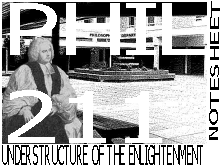 Hume 1
Hume 1 Hume 1
Hume 1Hume (1711-1776) wields the weapons of empiricism to show :-
Hume: we see a constant conjunction and move to the conclusion that there must be a necessary connection. This movement from the observation to the conclusion that there is a necessary connection is a matter of psychology.
What is the origin of our idea of necessary connection?
Hume says it comes from a habit.
I constantly seeing B immediately after seeing A.
This regular experience results in the following: my mind, when it sees A moves of itself to the thought of B. It doesn't wait for the sight of B. It moves on its own to the thought of B.
If I introspect on this activity of the mind, I see an association between two ideas, the idea of A and the idea of B. It is this which gives me the idea of necessary connection. Hume is suggesting a sort of projection.
'Suppose a person, though endowed with the strongest faculties of reason and reflection, to be brought on a sudden into this world; he would, indeed, immediately observe a continual succession of objects, and one event following another; but he would not be able to discover anything farther. He would not, at first, by any reasoning, be able to reach the idea of cause and effect ... nor is it reasonable to conclude, merely because one event, in one instance, precedes another, that therefore the one is the cause, the other the effect. Their conjunction may be arbitrary and casual. There may be no reason to infer the existence of one from the appearance of the other. And in a word, such a person, without more experience, could never employ his conjecture or reasoning concerning any matter of fact, or be assured of anything beyond what was immediately present to his memory and senses.
Suppose, again, that he has acquired more experience, and has lived so long in the world as to have observed familiar objects or events to be constantly conjoined together; what is the consequence of this experience? He immediately infers the existence of one object from the appearance of the other. Yet he has not, by all his experience, acquired any idea or knowledge of the secret power by which the one object produces the other; nor is it by any process of reasoning, he is engaged to draw this inference. But still he finds himself determined to draw it: and though he should be convinced that his understanding has no part in the operation, he would nevertheless continue in the same course of thinking. There is some other principle which determines him to form such a conclusion. This principle is Custom or Habit.'
Hume, Enquiry, V, I
'It is constantly supposed, that there is a connection between present fact and that which is inferred from it. Were there nothing to bind them together, the inference would be entirely spurious.' Hume, Enquiry, IV, 1.
If there are such things as laws of nature, then Hume's view of causality implies that they do not reflect real connections between things. They may express regularities - constant conjunctions - but if they do we cannot think of those regularities as rooted in anything. They are just regularities. They are simply patterns.
Related to Hume's view of causality is a modern account called the 'regularity' analysis. Here is a 'standard' formulation:
'If c is a cause of e, there must be types or kinds of events, F and G, such that c is of kind F, e is of kind G, and events of kind F are regularly followed by events of kind G.'
Audi's dictionary, article on 'Causation'.
VP